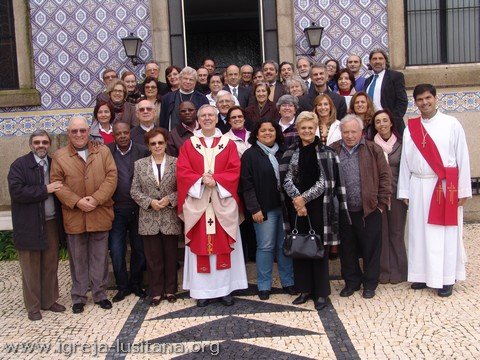The 94th Synod of Lusitanian Church was gathered in the parish Salvador do Mundo, in Vila Nova de Gaia, between 1st and 3rd November, having as its theme the words of Jesus to his disciples “It is I, be not afraid!” (St. John 6, 20).
The solemn opening of the Synod was held at a Eucharistic Service of celebration of the feast of all Saints Day, during which the ordination of a deacon took place. The agenda included, among other issues, the assessment of several internal reports, elections for the different positions and, in particular, the election of a new diocesan bishop, due to the fact that Rt Revd Fernando Soares has reached the age limit established in the canons of the Church.
This Synod occurred at a time marked by profound changes and challenges, not only for the church life as for the life of the country. In this context, it became clear that the Church, as part of Christ’s body rooted in the circumstances of every time and place, cannot fail to live deeply the realities that all Portuguese people experience these days.
Indeed, as the Bishop marked in his speech, Portugal is now “a devastated country that cries and feels indignation”,with “people astonished at the enormity of the austere measures that the Government wants to impose on them, on behalf of the payment of a debt that the vast majority of the Portuguese people do not understand, and which so far has not been explained (…).The people of Portugal became, for the Government that they have elected, a mere component of econometric models that can be manipulated in the light of ideologies more or less assimilated.”, also noting that “the human spirit of governance is being lost (…) there is no one who can tell us where such a governmental attitude will lead our country”.
Alongside this conjuncture, in which uncertainties undermine the confidence and the hope is absent from the future, we live today in Western societies a sociological change that has led to a devaluation of the presence of God in the social institutions, to “the indifference before the religious walk side by side with the rise of fundamentalisms” or an “unruly relativism that undoes the necessity of absolute acceptance” as expressed D. Fernando.
In this context, the Lusitanian Church, which has a primordial tradition of intervention in the case of the most disfavoured or vulnerable, has already been developing, within its possibilities, a remarkable job not only through the church-related IPSS, but also, for a few years now, through a Diocesan program carried out by the parishes and the women department, the Project Hope, which has allowed the direct support to many hundreds of needy families, wanting to go beyond the purely assistance-based approach and to be the sign of God’s love to those who suffer.
Reaffirming this identity, that constantly challenges us to a most effective intervention, the diocesan bishop has spoken to the Church: “we have to carry out an effective attitude of solidarity distributing the little we have for those that will literally run out of nothing”, and the Synod recognized that the Church needs to be a clear signal of hope and courage so that we can walk “between the pitfalls head-on and with determination” and of this position give inspiring testimony.
Reflecting the theme of the synodal meeting, participants recalled that the Church, in their vulnerability and limitations, is a privileged space to grow the faith and to replicate it through those glimmers of hope and change.
“Be not afraid!”, was the reassuring expression of Jesus to the disciples when they saw Him, in the darkness of the night, walking on the water; “be not afraid!” is a statement of confidence that the Church must transmit to the world; and this was also the challenge that Rt Revd Fernando left to the people of the Church: “be not afraid of asking to help others [referring to the Project Hope];of opening your heart to those in need of understanding and of a friendly Word; of telling the truth, even if it can cause you some harm; of fighting for Justice and dignity for you and the others, even if you have to face the incomprehension of men, because this is all part of the structure of the Kingdom of God in your lives. “
 Among the various decisions taken by the Synod was the election of a new diocesan bishop, who fell on the current Vicar General, Rev. Dr. Jorge Pina Cabral, a cleric of a wide pastoral experience, social commitment and a clear vision of the international Anglican context. This decision, which marks the beginning of a new cycle of leadership, represents a sign of vitality and of reaffirmation of the identity and of the founding principles of the Lusitanian Church based, now as in 1880, date of the founding Synod, in the Gospel truth and in the apostolic order, defending, always in a spirit of charity, the unity of what we consider certain and the freedom in the uncertainty, indeed, within the framework of broad Anglican tradition from which the Lusitanian Church is the Portuguese branch.
Among the various decisions taken by the Synod was the election of a new diocesan bishop, who fell on the current Vicar General, Rev. Dr. Jorge Pina Cabral, a cleric of a wide pastoral experience, social commitment and a clear vision of the international Anglican context. This decision, which marks the beginning of a new cycle of leadership, represents a sign of vitality and of reaffirmation of the identity and of the founding principles of the Lusitanian Church based, now as in 1880, date of the founding Synod, in the Gospel truth and in the apostolic order, defending, always in a spirit of charity, the unity of what we consider certain and the freedom in the uncertainty, indeed, within the framework of broad Anglican tradition from which the Lusitanian Church is the Portuguese branch.
In this time of handover, the Synod naturally pointed out the long and blessed episcopate of Rt Revd Fernando, started in 1980 and reflected by a period of modernization of the Church, adaptation to the democratic society and reaffirmation of the spirit of profound liturgical and sacramental life which constitutes today an essential mark of the Lusitanian identity, assuring to the Church, at the same time, an international recognition largely higher than its dimension in the Anglican family. For all this, the Synod gave thanks to God and thanked rt Revd. Fernando the deep commitment, generosity and total offering with which he gave himself to the Lusitanian Church.
In times of change and renewal, but also of crisis and austerity, anguish and uncertainty in the society in which we live, the Lusitanian Church, also in the context of difficulties, fear and even persecution, must be at the forefront as a motivator of change, trust and hope. This is the final vote of the Synod and a prayer to the Lord of Life.
Vila Nova de Gaia, November 3, 2012
You find a summary of this text on the German Newsite of our Homepage.

